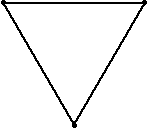
Remember
this one?
In this problem, the three bugs start at the corners of an equilateral triangle (with side length=10 inches).
Again, the bugs travel directly towards their neighbor (counter-clockwise). And, again, each bug homes in on its target, regardless of its target's motion. So, their paths will be curves spiraling toward the center of the triangle, where they will meet.
What distance will the bugs have covered by then, and how did you determine it?
(In reply to
answer by K Sengupta)
Let the triangle be denoted by ABC. At any given instant, the three bugs located at each of the vertices A, B and C of the triangle which shrinks and rotates as the three bugs move closer together. Thus, the three bugs will describe three congruent logarithmic spirals that will meet at the center of the triangle.
Since each angle of an equilateral triangle is 60 degrees, it follows that the path of the pursuer and the pursued will describe an angle of 60 degrees between them and consequently, each bug's motion will have a component equal to cos 60 = 0.5 times its velocity that will carry it towards its pursuer. Thus, these two bugs will have a mutual approach speed of 1 + 0.5 = 1.5 times the velocity of each bug.
Consequently, the required distance tcovered by each of the three bugs until they meet at the center of the triangle
= 10/(1.5)
= 6.667 inches (approximately)
Edited on May 16, 2007, 5:43 am
 Remember this one?
Remember this one?


